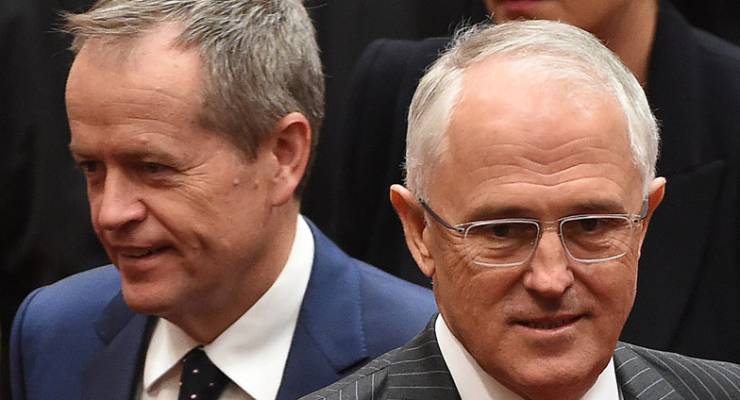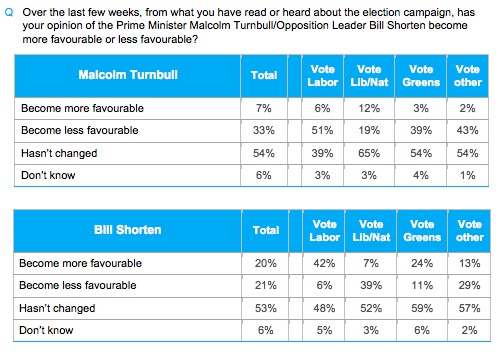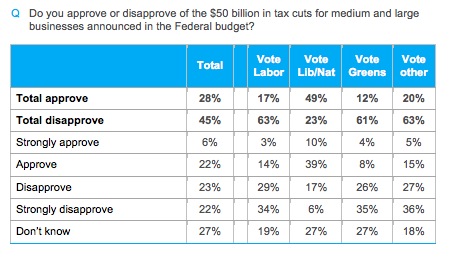
The parties remain gridlocked four weeks out from the July 2 election, with today’s Essential Report two-party preferred outcome showing the parties at 50% each.
The Coalition’s primary vote remains at 41%, while Labor’s primary vote is up a point from last week to 36%. The Greens have also recovered a point to 10%, NXT is on 4% and “others” are on 10%. A 50-50 two-party preferred outcome — down from 51-49 to the Coalition last week — would, on an implausible national uniform swing, deliver Labor 14 seats, leaving the Coalition in government with a small majority.
However, Opposition Leader Bill Shorten appears to be having a better campaign than Prime Minister Malcolm Turnbull: 20% of voters say their opinion of Shorten has become more favourable during the campaign, while 21% say it has become less favourable; 53% say the campaign hasn’t changed their opinion. In contrast, just 7% say their opinion of Turnbull has become more favourable, compared to 33% who say it has become less favourable.

While partisanship plays a strong role in those responses, the reaction from Labor voters to Shorten has been far more positive than the reaction of Liberal voters to Turnbull: 42% of Labor voters says they view the party leader more favourably, compared to just 12% of Liberal voters who have warmed to Turnbull. That’s not necessarily a huge positive for Shorten — it may reflect that Labor voters were in two minds about him but have now come around. But 39% of Liberal voters say they view Shorten less favourably now compared to 51% of Labor voters who view Turnbull less favourably, and Greens voters have also warmed much more to Shorten. “Other” voters, too, seem to reacted more favourably to Shorten’s campaign than Turnbull’s campaign.
On one of the central issues of the campaign, the Coalition’s 10-year tax cut for multinationals and big companies, just 28% of voters approve of it, compared to 45% who disapprove of it — including 22% of voters who strongly disapprove of it. The disapprovers include 23% of Liberal voters.

There’s worse news for the Coalition on trust in the parties over specific issues. The Coalition’s trust numbers improved in May, delivering it a solid lead over Labor across a number of issues and curbing Labor’s own lead on topics where Labor was traditionally strong. But four weeks into the campaign, those numbers have deteriorated for the Coalition. On the Coalition’s two strongest issues, security and economic management, its lead as the trusted party over Labor has fallen: from 23 percentage points to 18 points on security and, more alarmingly, from 20 to 12 points on the economy.
On political leadership — one area where the Coalition weakened in May — its lead is now eight points, down from 11 in May and 16 in March. The most interesting issue is “treatment of asylum seekers”, where the Coalition’s lead over Labor is now just four points (32% trust in the Coalition to 28% trust in Labor), down from eight points in May, suggesting that Peter Dutton’s demonisation of refugees and Barnaby Joyce’s attempt to link the live cattle export issue to boats might have actually backfired on the government.

Labor has increased its leads on the two issues at the centre of its campaign: its lead on education is up to 14 points from 11, and on health to 13 points from 11, but on other issues it has marked time — its lead on industrial relations and jobs have shrunk a point, for instance.
While conservative parties have a better reputation among voters for fiscal and economic management, progressive parties often seek to reframe the economic debate away from the issue of management to management for voters — for example, managing the economy for working families, managing it for the middle class, managing it to produce jobs. Specific questions on economic management asked by Essential reflect this: the government leads Labor, for example, by 14 points on “handling the economy overall” — about the same as its lead on the economic question on party trust above. However, Labor leads by 10 points on “standing up for the middle class in Australia” and eight points on “representing the interests of you and people like you”, and the ALP trails the Coalition by only two points on “handling the economy in a way that best helps the middle class” and leads by three points on “handling the economy in a way that helps you and people like you the most”. In contrast, the Coalition leads strongly on “representing the interests of the large corporate and financial interests” — and the government has played into Labor’s hands on that issue with its massive corporate tax cut and defence of big banks.
There’s good news for both sides in these numbers: on voting intention, the government is headed for a win, albeit a narrow one. But Bill Shorten has so far had a better campaign than his opponent. And rather than burnishing the Coalition’s credentials in its traditional strong areas of economic management, security and asylum seekers, the campaign appears to have undermined voter perceptions in those areas while Labor has hammered its strengths in health and education. But the opposition is yet to convert that declining trust in a Turnbull government into votes. Whether it can over the next four weeks will finally resolve this extended polling arm wrestle.








Interestingly, for the question “Which of the following actions on climate change would you most support?”
Half the respondent overwhelmingly support “Incentives for renewable energy” (49%) over an ETS (13%), Abbott’s “Direct Action” (10%) or no action (10%). Breakdown by parties for an renewable energy incentives are Labor 50%, Coalition 48%, Greens 58% and others 54%.
To paraphrase a cod quote, “if they have high power bills, let them vote with their roof tops!”.